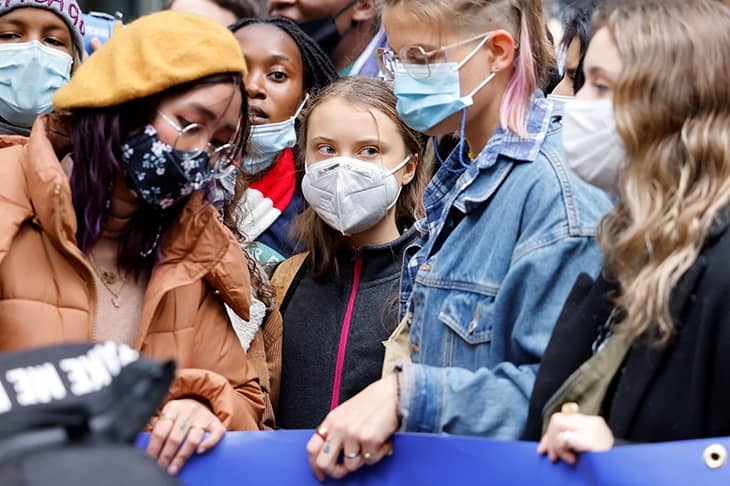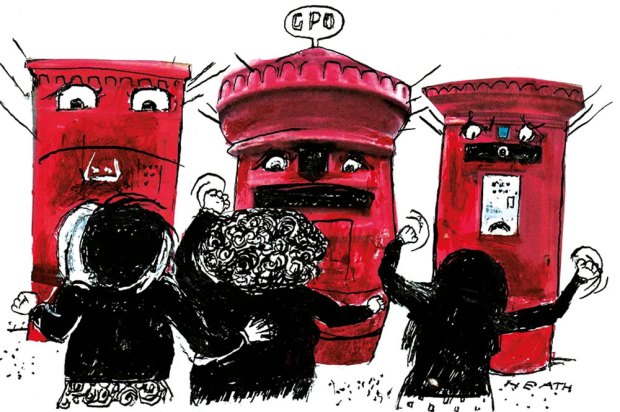I have observed before how useful really big numbers can be in response to crises: when US treasury secretary Hank Paulson unveiled his $700 billion Wall Street bailout package in 2008, an aide famously let slip that the number had been pulled out of the air because it sounded reassuringly huge. Now we’re told that more than 450 banks and investment firms representing $130 trillion of assets (that’s 40 per cent of global savings, give or take a few soaring bitcoins) have joined the Glasgow Financial Alliance for Net Zero led by Mark Carney and Michael Bloomberg, who tell us that ramping up clean energy fast enough to avoid the worst impacts of climate change will require new investment, mostly from the private sector, ‘likely in the ballpark of $100 trillion’.
So the $130 trillion already committed is bigger than the $100 trillion needed? And the City of London, rebranded by Rishi Sunak as ‘the world’s first net-zero financial centre’, is honing its celebrated innovation skills to lead us all to safety? Phew, that’s a relief — or perhaps not quite.
Cynics have pointed out that fossil-fuel industry delegates outnumbered any other mission to COP26 and that signatories to the groups which make up Carney’s alliance, having provided $4 trillion of funding for coal, oil and gas projects since 2015, are not barred from providing more. This year’s quadrupling of carbon energy prices also happens to have made those projects increasingly attractive to the sort of money that does not sign up to virtuous alliances at all. ‘Hedge funds flock to oil as energy shortages worsen’ was a recent Reuters headline, while US private equity firms continue quietly buying up the coal mines and coal-fired power plants that public citizens of the financial world are now embarrassed to own.
So should we expect as little impact from the finance piece of COP26 as from, say, the pledge to end deforestation — which seems only likely to happen if Brazilian and Indonesian loggers are literally bribed to stop? Again, perhaps not quite. Major banks and the investment firms that manage our pensions and savings are among the most regulated businesses on the planet as well as the most sensitive to the whims and demands of shareholders and customers. The climate action agenda has sufficient momentum that no public-facing brand in this or any other sector can afford to be seen as a laggard.
Those big numbers bandied in Glasgow may prove as evanescent as the rhetoric of Barack Obama and Greta Thunberg. But China and India apart, the movement is very largely in one direction and the private sector is leading it. You’ll be surprised to hear me say this, but if anyone can save the world, it’s most likely the bankers.
Under fire
Bank of England governor Andrew Bailey (of whom I may say more next week) is under fire for not raising interest rates. Last week’s Monetary Policy Committee decision — 7-2 for holding the base rate at 0.1 per cent, where it has sat since March last year — wasn’t determined by his personal vote. But the market, including mortgage lenders, felt he’d given a strong signal of a counter-inflationary rise to 0.25 per cent. And when that didn’t happen the pound fell, adding to inflation by increasing import costs.
The explanation for delaying a rate rise is that economic recovery is weaker than it first looked and an immediate increase in borrowing costs, on top of energy price hikes, might have tipped it back further. Meanwhile the Bank says it thinks inflation will peak at 5 per cent next April before starting to fall as supply and labour shortages ease. But what if inflation goes higher for longer, as some of us expect, and hesitant, fractional rises have little impact on it?
‘We’re not going back… to 4 or 5 per cent [interest rates]’ as a norm, Bailey told the Today programme. As for inflation: ‘We’re not going back to the 1970s.’ But what tools does he have left in his box? As his predecessor Mervyn King once said, forecasting is a mug’s game: but I predict Bailey will be taking flak in a year’s time that will make last week’s salvo look tame.
Caught out
Yorkshire County Cricket Club, up to its neck in racism allegations, has lost the sponsorship of two of the county’s most admired businesses. Yorkshire Tea is a product of the family-run, Harrogate-based group, also including Taylors coffee and Bettys teashops, which prides itself on high ethical standards and benign links with growers in India and Kenya. Emerald is an academic publishing enterprise in Bingley that was founded by a friend of mine, Keith Howard — who died in August aged 89 having given £10 million for the redevelopment of Yorkshire’s Headingley stadium, partly to ensure its facilities stayed up to scratch for Test matches.
Keith would be appalled to know that the ECB has suspended the club from hosting international fixtures — and deeply saddened by the whole episode, which carries a curious echo of his own youthful experience. Opening the bowling for Leeds Grammar School against an eleven fielded by the great pre-war Yorkshire and England batsman Herbert Sutcliffe, he had Sutcliffe himself caught on the boundary for a duck. Sutcliffe then arranged a trial for Keith in the Headingley nets — but hopes that the youngster might play for Yorkshire were swiftly crushed, for the simple reason that he had been born in Lancashire.
His, hers and theirs
Marks & Spencer’s decision to allow pronoun choices such as ‘He/Him/His’ on staff name badges is a sign of the times that may occasionally be helpful for shortsighted customers but won’t make much difference if Christmas shelves are empty of pigs in blankets and bacon-wrapped stuffing parcels. And I think Dear Mary needs to tell us how to respond correctly to the helpful assistant whose badge says ‘They/Them/Their’: is it ‘Thank you both very much’?
Got something to add? Join the discussion and comment below.
Get 10 issues for just $10
Subscribe to The Spectator Australia today for the next 10 magazine issues, plus full online access, for just $10.
You might disagree with half of it, but you’ll enjoy reading all of it. Try your first month for free, then just $2 a week for the remainder of your first year.















Comments
Don't miss out
Join the conversation with other Spectator Australia readers. Subscribe to leave a comment.
SUBSCRIBEAlready a subscriber? Log in